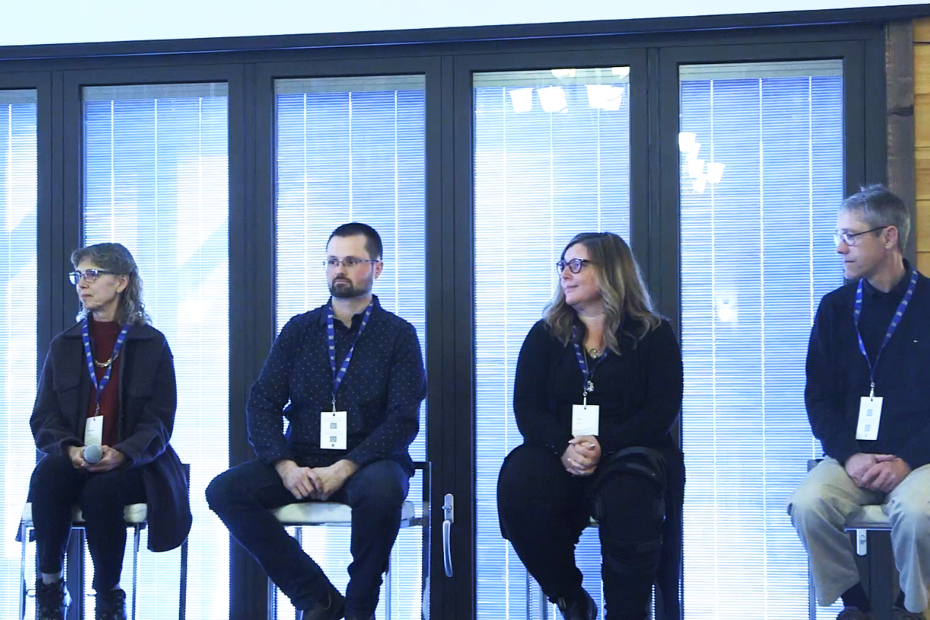The Next Green Revolution in Barrie, Ont.: What it will take to improve agricultural sustainability on farms

Published August 16, 2023 • 5 Min Read
-
Christine Brown, Field Crop Sustainability, Ontario Ministry of Agriculture, Food and Rural Affairs (OMAFRA)
-
Eric Wright, a Midhurst-based Dairy Farmer
-
Jody Mott, Executive Director, Holland Marsh Growers’ Association
-
Stephen Kell, an Innisfil-based Farmer and Grain Merchant
Each spoke about their experiences working in Holland Marsh, one of the most fertile farming areas in the country – generally consisting of 20 to 80 per cent of organic material in the upper layer. Located about 50 kilometres north of Toronto, “The Marsh” is more than 7,000 acres of reclaimed swamp that was drained in the early 1900s. Today, the area feeds approximately 75 per cent of Ontarians and 65 per cent of Canadians.
Here’s a snippet of what the panelists had to say.
Benchmarking needs to get more consistent
One of the biggest concerns the panelists raised is that everyone – from government officials to farmers – have a different way of establishing and monitoring benchmarks when it comes to soil health, crops, yields – basically everything. That needs to change.
“I think the interesting challenge – and maybe it falls to Christine’s group [OMAFRA] – is we need to come up with a checklist where we as farmers can measure our behaviour and then we can calculate whether we’re doing constructive things in terms of [agricultural] sustainability or not,” noted Stephen.
He added that farmers should have a say in the benchmarking process, because they’re the ones who will have to manage the consequences of their behaviour, something Jody wholeheartedly agreed with.
“It’s not scientific to the farmers; they know what they’re doing. Give the farmers their soil, let them grow their vegetables, let them harvest it, and bring it,” she said, noting farmers shouldn’t have to try to interpret something passed down by the government. The goal should be to reduce red tape and focus on farming.
Funding to support innovation needs to increase
When it comes to innovation, Christine noted it’s not just agricultural sustainability that farmers are striving to achieve – it’s also ensuring all they do makes good sense economically. And though farmers want to innovate and try new things, adopting new technology can cost a lot of money.
“There are a lot of times when there are new ideas… and there are people that want to try things, but they’re afraid economically to take too big a step,” she said, noting financial support from banks “and programs from all levels of government help increase adoption of new tools on farms.”
Stephen added: “We have to be prepared to take some chances and make some investments and help [ideas] develop a lot more quickly.”
Communication needs to improve
Farmers love to communicate, which is something Stephen noted. They love to get together to share ideas “whether it’s around the back of a pickup truck or in a more formal setting,” but he said they need to encourage more opportunities for connection so they can discuss topics like agricultural sustainability.
They also need to get more comfortable having that conversation.
“I think if you were at a farm meeting and you started talking about the environment and climate change and carbon emissions, you might get shunned,” he said. “So we need to make [discussing it] safer and that’s going to fall on every one of us to join into that conversation and not be shy about participating in it because it’s something we’re going to have to be able to deal with.”
For Eric, it’s also critical that everyone – from consumers to government officials – knows the effort that farmers put into cultivating crops and keeping their land healthy.
“We need to tell our story. That’s the big thing. Most people in Ontario, and Canada in general, are two or three generations removed from production agriculture. They don’t know what we do, and people need to tell their story,” he said.
Jody echoed that sentiment by saying “farmers want to feed people… we have to spread the word.”
Christine added: “We’re all working together to try and improve things… and getting together in groups, sharing ideas… [doing that will generate] new ideas, so [we can innovate] and everyone can do [things] better.”
To learn more about RBC’s recent report The Next Green Revolution, click here.
You can also hear what agriculture industry experts and farmers at our other events had to say about the future of farming when it comes to sustainable agriculture.
While information presented is believed to be factual and current, its accuracy is not guaranteed and it should not be regarded as a complete analysis of the subject matter discussed. All expressions of opinion reflect the judgment of the author(s) as of the date of publication and are subject to change. No endorsement of any third parties or their advice, opinions, information, products or services is expressly given or implied by Royal Bank of Canada or its affiliates.
This article is intended as general information only and is not to be relied upon as constituting legal, financial or other professional advice. A professional advisor should be consulted regarding your specific situation. Information presented is believed to be factual and up-to-date but we do not guarantee its accuracy and it should not be regarded as a complete analysis of the subjects discussed. All expressions of opinion reflect the judgment of the authors as of the date of publication and are subject to change. No endorsement of any third parties or their advice, opinions, information, products or services is expressly given or implied by Royal Bank of Canada or any of its affiliates.
Share This Article





